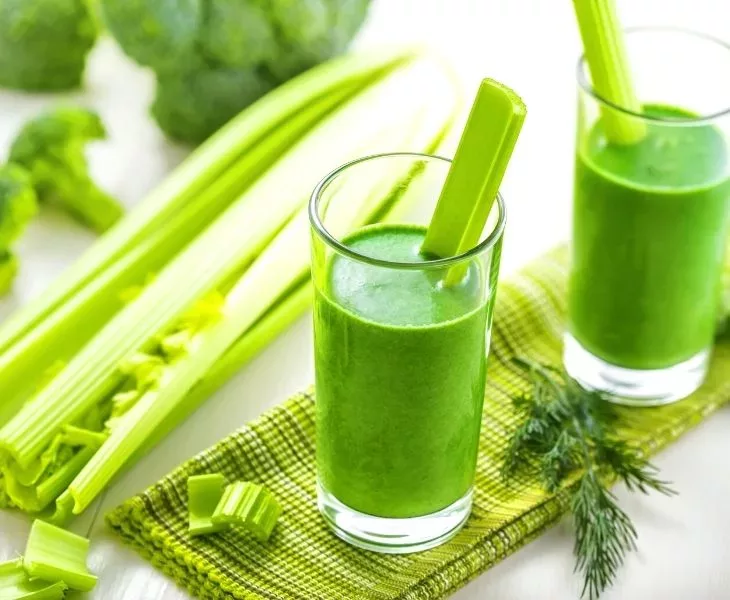Celery as Anti-Inflammatory Food for Rheumatism
Celery has gained recognition as a potent anti-inflammatory food, offering potential relief for rheumatism, a chronic condition characterized by persistent joint pain and arthritis.

While current evidence and preliminary research support the anti-inflammatory properties of celery, further studies are required to conclusively establish its efficacy in managing rheumatism.
Packed with antioxidants like flavonoids and polyphenols, celery contains compounds that have demonstrated the ability to reduce inflammation and inhibit specific enzymes associated with the inflammatory process.
Notably, celery houses a unique compound, 3-n-butylphthalide (3nB), known for its anti-inflammatory effects.
However, it’s essential to acknowledge that rheumatism is a complex ailment with diverse underlying causes.
Managing it requires a multidimensional approach involving medications, lifestyle adjustments, and dietary considerations.
Celery, while potentially beneficial, should not replace professional medical advice or prescribed treatments.
Tips About Celery and Ways to Incorporate It into Your Diet
Raw Delight: Enjoy celery raw as a snack or add it to salads for a refreshing crunch. Simply cut celery stalks into sticks and savor them alone or with your preferred dip or spread.
Soups and Stews: Enhance the flavor and texture of soups and stews by chopping celery stalks and incorporating them into your favorite recipes during the cooking process.
Stir-Fries and Sautés: Add a tasty twist to stir-fries and sautés by slicing celery stalks diagonally. Combine them with other vegetables and proteins for a quick and nutritious meal.
Juicing Magic: Harness the health benefits of celery by juicing its stalks using a juicer or blending them with water. Strain the mixture to create homemade celery juice, which can be enjoyed on its own or blended with other fruits and vegetables for added flavor.
Smoothie Bliss: Boost your smoothies’ nutritional content by blending celery stalks with fruits, leafy greens, and liquids like water, coconut water, or almond milk.
Roasted Goodness: Experience the natural sweetness of celery by roasting stalks with olive oil, salt, and pepper. Use roasted celery as a side dish or a topping for salads and grain bowls.
Remember to wash celery thoroughly before use and store it in the refrigerator to maintain freshness.
Important Tips for Using Celery:
- Daily Celery Juice Ritual: To reset your body, consume a full 16 ounces of fresh celery juice daily on an empty stomach. For more pronounced results, consider drinking two 16-ounce glasses a day.
- Opt for Organic: Choose organic celery whenever possible. If using conventional celery, ensure thorough washing to remove dirt and pesticides before juicing.
- Adjust the Taste: If the taste of straight celery is too intense, consider juicing it with a cucumber and/or apple initially. Gradually transition to pure celery juice for maximum benefits.
- Start Slow: If the full 16 ounces feels overwhelming initially, begin with a few sips and gradually increase over time.
- Gentle Alternatives: If celery juice is too strong, substitute with fresh cucumber juice, offering a milder option with similar benefits.
In Conclusion
Rheumatism, particularly rheumatoid arthritis, demands a comprehensive treatment approach. Celery, with its anti-inflammatory properties, holds promise in supporting overall health, especially for those managing arthritis.
Incorporating celery into your diet, along with maintaining a healthy weight and choosing anti-inflammatory foods, can contribute to a holistic strategy for managing these chronic conditions.
Remember, personalized advice from healthcare professionals is crucial for effective symptom management.
Can celery alone cure rheumatism?
While celery is recognized for its anti-inflammatory properties, it is not a cure for rheumatism. Rheumatism is a complex condition with various underlying causes, and its management typically involves a comprehensive approach, including medications, lifestyle modifications, and dietary considerations. Celery can be a beneficial addition to a balanced diet, but it should not replace medical advice or prescribed treatments.
How should I incorporate celery into my daily routine for anti-inflammatory benefits?
To harness the anti-inflammatory benefits of celery, consider consuming a daily 16-ounce glass of fresh celery juice on an empty stomach. For a milder taste, you can initially blend celery with cucumber or apple. Additionally, include celery in your diet through raw snacks, salads, soups, stews, stir-fries, and roasted dishes. However, always consult with a healthcare professional for personalized advice based on your specific health needs.
Is celery juice suitable for everyone, and are there alternatives for those who find it too strong?
While celery juice can be beneficial for many, it may be too intense for some individuals. If the taste is overpowering, start with a few sips and gradually increase over time. Alternatively, fresh cucumber juice offers a milder option with similar benefits. It’s essential to listen to your body and consult with a healthcare professional to determine the most suitable approach for incorporating celery or alternatives into your routine.
Disclaimer: The following information is provided solely for informational purposes and should not be considered professional advice or a substitute for professional consultation. While every effort has been made to ensure the accuracy and reliability of the information presented, we make no representations or warranties of any kind, express or implied, regarding the completeness, accuracy, reliability, suitability, or availability of the information provided. Any reliance you place on such details is strictly at your own risk.









6 thoughts on “Celery: Powerful Anti-Inflammatory Food for Rheumatism”